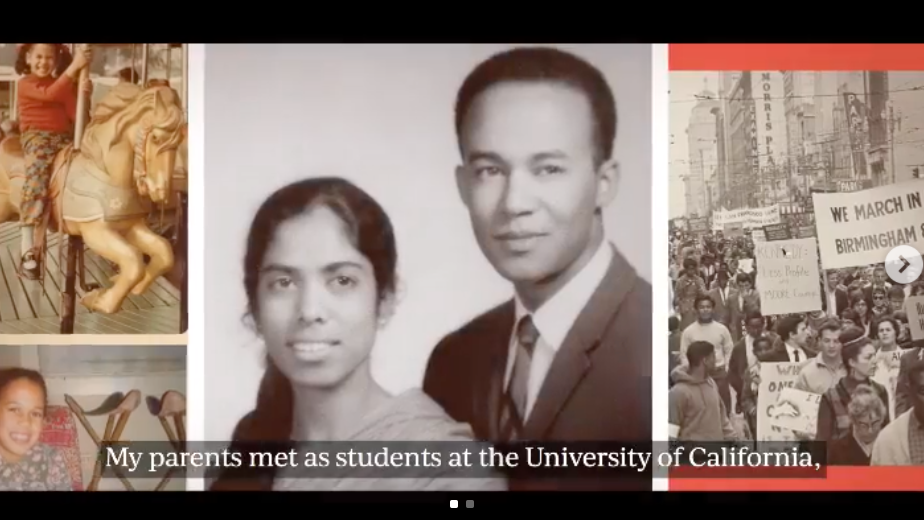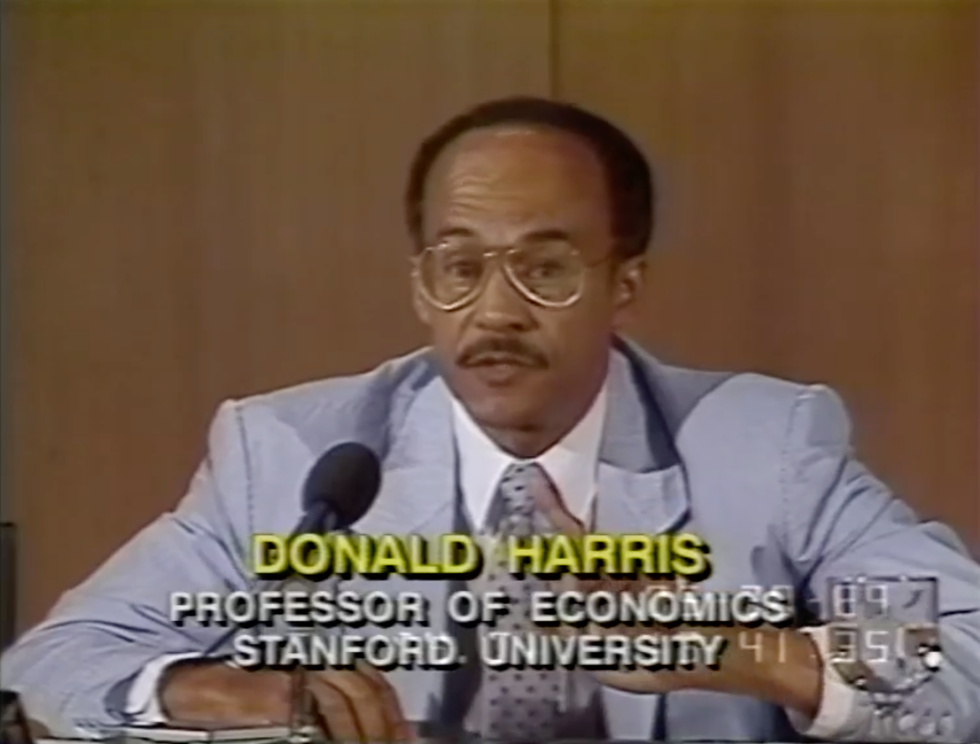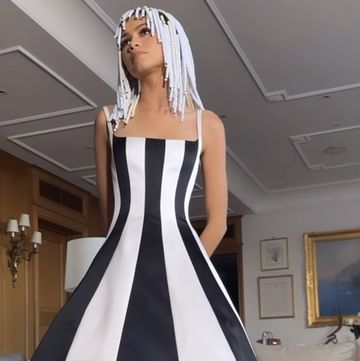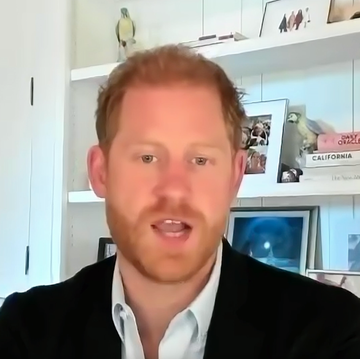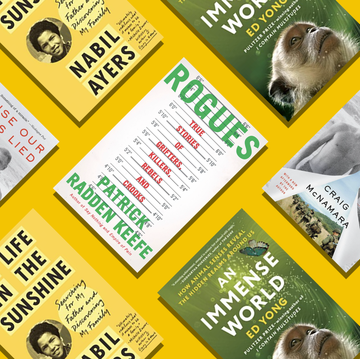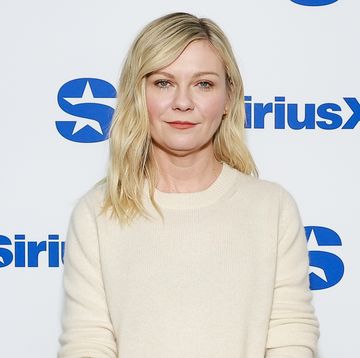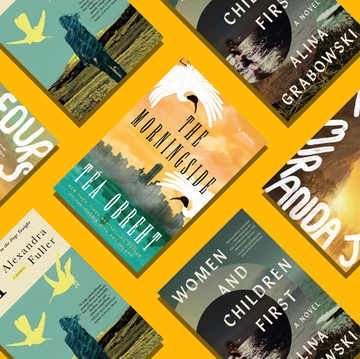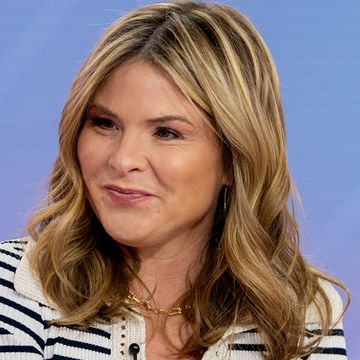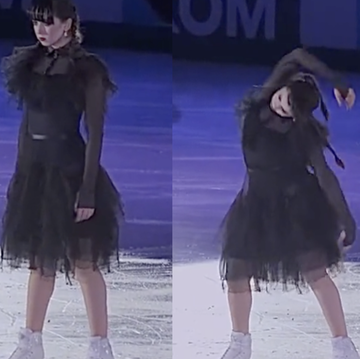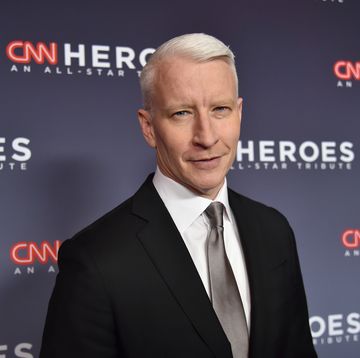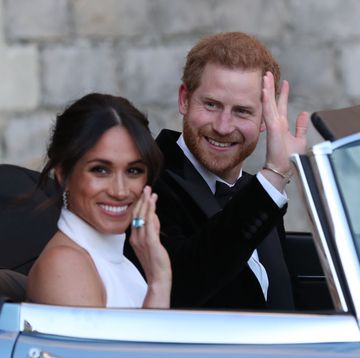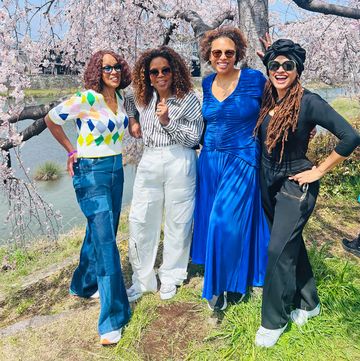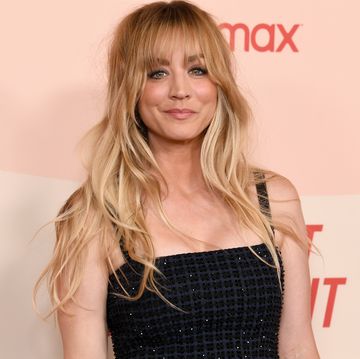- Vice President Kamala Harris was born on October 20, 1964 in Oakland, California to two immigrant parents: mom Shyamala Gopalan, and dad Donald Harris.
- A prominent cancer researcher before passing away in 2009, Gopalan was born in India and came to the United States to get her PhD from the University of California, Berkeley.
- Donald Harris was born in Jamaica but immigrated to the United States for a graduate degree, eventually becoming a Professor of Economics at Stanford University.
Vice President Kamala Harris had a supportive roster of family members by her side throughout the years. From her husband Douglas Emhoff, to her accomplished sister Maya and her step-children, the history-making politician has taken to social media over the years to share plenty about the loved ones she holds dear.
One important part of her backstory is her biracial African American and Indian-American identity she inherited from her parents, Shyamala Gopalan and Donald Harris, who both immigrated to the United States (from India and Jamaica, respectively) to pursue doctorate degrees at the University of California, Berkeley.
"My parents marched and shouted in the civil rights movement of the 1960s. It’s because of them and the folks who also took to the streets to fight for justice that I am where I am," Harris wrote on Instagram. "They laid the path for me, as only the second Black woman ever elected to the United States Senate."
Although Gopalan and Harris eventually divorced in 1971, the two were an accomplished duo. After graduating, Gopalan went on to become a prominent cancer researcher, while Harris remains a Professor of Economics, Emeritus, at Stanford University.
Here's what we know about the parents who helped shape Harris from a young age.
Shyamala and Donald first met in Berkeley, California.
They both immigrated to the United States to receive doctorate degrees at the University of California, Berkeley. The two "met and fell in love at Berkeley while participating in the civil rights movement," according to Harris's autobiography, The Truths We Hold. "[Shyamala's] marriage—and her decision to stay in the United States—were the ultimate acts of self-determination and love."
They were active in the civil rights movement.
They even took a young Kamala to some of the marches. According to a 2004 clip from the Los Angeles Times, "a favorite family story begins with Harris's parents pushing her in a stroller as they marched for civil rights, joining in the protest chants. After one march, Harris's mom innocuously asked, 'What do you want, Kamala?' The toddler replied: 'FEE-DOM!'"
Kamala Harris's mom was a prominent breast cancer researcher.
"My mother was a pioneering breast cancer researcher, so I grew up learning about the importance of screening and early detection," Harris shared in an Instagram post during Breast Cancer Awareness Month.
Shyamala's work took her to many top research institutions including University of Illinois, University of Wisconsin, Department of Medicine at McGill University in Montreal, as well as Lawrence Berkeley National Laboratory. "She made substantial contributions to the field of hormones and breast cancer, publishing her research in countless journals and receiving numerous honors," according to her obituary.
Shyamala was the daughter of an Indian diplomat and a women’s rights activist.
"When I was a young girl visiting my grandparents in India, I’d join my grandfather and his buddies on their morning walk along the beach as they would talk about the importance of fighting for democracy and civil rights," Harris wrote in an Instagram post. "Those walks made me who I am today."
In addition, Shyamala's mother Rajam was a role model to the young Harris daughters due to her work for women's rights. "Kamala comes from a long-line of kick ass women," Shyamala told the Los Angeles Times.
She was very engaged with the news.
"For as long as I could remember, my mother loved to watch the news and read the newspaper," Vice President Harris wrote in a New York Times op-ed. "When Maya and I were kids, she’d insist we sit down in front of Walter Cronkite each night before dinner."
And, she raised Harris and her sister as "strong, Black women."
"My mother was very intentional about raising my sister, Maya, and me as strong, Black women," Harris noted on social media. "She coupled her teachings of civic duty and fearlessness with actions, which included taking us on Thursday nights to Rainbow Sign, a Black cultural center near our home. There we were always greeted with warm hugs and exposed to extraordinary people like Shirley Chisholm, Nina Simone, and Maya Angelou who helped show us what we could become."
In her 2018 autobiography, Harris explained her mother's thinking: "She knew that her adopted homeland would see Maya and me as Black girls, and she was determined to make sure we would grow into confident Black women."
Shyamala passed away in 2009.
"It was one of the worst days of my life," Vice President Harris wrote in a New York Times opinion piece reflecting on the day in 2008, when her mom told her she was diagnosed with colon cancer. Despite receiving chemotherapy treatments, Shyamala passed away on Feburary 11, 2009. "Are my daughters going to be O.K.?" was one of the last questions Shyamala asked the hospice nurse, and according to Harris, "she was focused on being our mother until the very end."
She added: "And though I miss her every day, I carry her with me wherever I go. I think of the battles she fought, the values she taught me, her commitment to improve health care for us all. There is no title or honor on earth I’ll treasure more than to say I am Shyamala Gopalan Harris’s daughter."
Ahead of her inauguration, Harris said in an interview with NPR, "I will be thinking about my mother, who is looking down from heaven. I will be thinking about all of the people who are counting on us to lead and are counting on us to see them and to address their needs and the things that keep them up at night. And I'll be thinking about the fact that we have to hit the ground running immediately to support the people of our country, to support the children of our country, and to help get us out of the crises that we're facing."
Donald Harris was born in Jamaica.
According to Harris's 2018 autobiography, Donald was born in Jamaica in 1938 and immigrated to the United States to get his doctorate degree from the University of California, Berkeley. He eventually became a naturalized United States citizen.
Harris's dad is a Professor of Economics, Emeritus at Stanford University.
According to the Stanford Department of Economics, Donald joined the faculty in 1972 after three years as a tenured professor at University of Wisconsin (Madison). At Stanford he taught undergraduate classes like "Theory of Capitalist Development" as well as working with graduate students in a new program called "Alternative Approaches to Economic Analysis." Donald stayed on at Stanford until 1998, when he took early retirement to pursue his long-term interest in "developing public policies to promote economic growth and advance social equity."
Donald took his daughters to visit Jamaica at an early age.
According to an essay Donald wrote for Jamaica Global Online, he tried to show his daughters their heritage "through frequent visits to Jamaica and engaging life there in all its richness and complexity."
"One of the most vivid and fondest memories I have of that early period with my children is of the visit we made in 1970 to Orange Hill," he recounted. "We trudged through the cow dung and rusted iron gates, up-hill and down-hill, along narrow unkempt paths, to the very end of the family property, all in my eagerness to show to the girls the terrain over which I had wandered daily for hours as a boy."
He continued: "Upon reaching the top of a little hill that opened much of that terrain to our full view, Kamala, ever the adventurous and assertive one, suddenly broke from the pack, leaving behind Maya the more cautious one, and took off like a gazelle in Serengeti, leaping over rocks and shrubs and fallen branches, in utter joy and unleashed curiosity, to explore that same enticing terrain. I quickly followed her with my trusted Canon Super Eight movie camera to record the moment (in my usual role as cameraman for every occasion). I couldn’t help thinking there and then: What a moment of exciting rediscovery being handed over from one generation to another!"
Donald and Shyamala divorced when Harris was seven years old.
After the divorce, Shyamala was granted custody of their two daughters. Donald wrote in the Jamaica Global Online essay that his earlier interactions with his children "came to an abrupt halt in 1972" and that he lost a "hard-fought custody battle in the family court of Oakland, California." Although Harris herself doesn't talk much about her dad as an adult, Donald shared pictures of them together in his 2018 essay, and wrote: "Nevertheless, I persisted, never giving up on my love for my children or reneging on my responsibilities as their father."
He criticized one of Harris's jokes on the campaign trail, but is staying out of politics, for now.
In February 2019, as Harris was running her own campaign for President, she made a joke during a radio interview with The Breakfast Club that involved smoking marijuana and her Jamaican heritage—but it didn't go over well with her father.
In response, Donald sent a statement to Jamaica Global Online regarding her daughter's joke. "My dear departed grandmothers (whose extraordinary legacy I described in a recent essay on this website), as well as my deceased parents, must be turning in their grave right now to see their family’s name, reputation and proud Jamaican identity being connected, in any way, jokingly or not with the fraudulent stereotype of a pot-smoking joy seeker and in the pursuit of identity politics," he wrote.
But you probably won't see him getting more involved in the future. According to an email reviewed by Politico, Donald wrote: "I have decided to stay out of all the political hullabaloo by not engaging in any interviews with the media."
For more stories like this, sign up for our newsletter.
